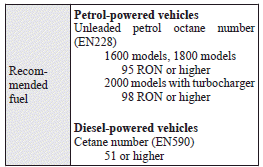Fuel selection

For the petrol-powered vehicles with turbocharger, your engine is designed to provide satisfactory performance by using unleaded petrol octane number 98 RON or higher. In order to maintain engine performance and exhaust system durability, use unleaded petrol octane number 98 RON or higher.
![]() Caution
Caution
► For petrol-powered vehicles, the use of leaded fuel can result in serious
damage to the engine and catalytic converter. Do not use leaded fuel.
► Diesel-powered vehicles are designed to use only diesel fuel that meets the
EN590 standard.
Use of any other type of diesel fuel (bio diesel, methylester, etc.) would adversely affect the engine’s performance and durability.
![]() Note
Note
► Due to the separation of paraffin, the fluidity of the fuel decreases considerably as the temperature falls.
Because of this fact there are two kinds of fuel: “summer” and “winter”.
This must be considered in winter use.
Select either of the two kinds of fuel in accordance with ambient temperature.
Above -5 °C: “Summer” diesel
Below -5 °C: “Winter” diesel
When travelling abroad, find out in advance about the fuels served in local service
stations.
► Petrol-powered vehicles of 1600 and 1800 models have the knock control system so that you can use unleaded petrol 90 RON as an emergent measure in case unleaded petrol 95 RON or higher is not available on journey, etc. In such a case, you don’t need to adjust the engine specially.
In case of using unleaded petrol 90 RON, the engine performance level is reduced.
► The petrol-powered vehicles with turbocharger have the knock control system so that you can use unleaded petrol 95 RON as an emergent measure in case unleaded petrol 98 RON or higher is not available on journey, etc. In such a case, you don’t need to adjust the engine specially.
In case of using unleaded petrol 95 RON, the engine performance level is reduced.
► Repeatedly driving short distances at low speeds can cause deposits to form in the fuel system and engine, resulting in poor starting and poor acceleration. If these problems occur, you are advised to add a detergent additive to the gasoline when you refuel the vehicle.
The additive will remove the deposits, thereby returning the engine to a normal condition.
Be sure to use a genuine MITSUBISHI FUEL SYSTEM CLEANER.
Using an unsuitable additive could make the engine malfunction. For details, please contact a MITSUBISHI MOTORS Authorized Service Point.
► Poor quality petrol can cause problems such as difficult starting, stalling, engine noise and hesitation. If you experience these problems, try another brand and/or grade of petrol.
If the check engine warning lamp flashes, have the system checked as soon as possible at a MITSUBISHI MOTORS Authorized Service Point.
E10 type petrol
The petrol engines are compatible with the E10 type petrol (containing 10 % ethanol) conforming to European standards EN 228.
![]() Caution
Caution
► Do not use more than 10 % concentration of ethanol (grain alcohol) by volume.
Use of more than 10 % concentration may lead to damage to your vehicle fuel system,
engine, engine sensors and exhaust system.
See also:
What to do if the following occur with the Twin Clutch SST
If there is a malfunction in the Twin Clutch SST or engine electronic control
module, the following may occur.
► Twin Clutch SST does not shift.
► Vehicle cannot move.
► Twin Cl ...
Exterior and interior lamp operation
Operate the combination lamp switch to check that all lamps are functioning properly.
If the lamps do not illuminate, the probable cause is a blown fuse or defective
lamp bulb. Check the fuses fir ...
Multi centre display
When the ignition switch is in the ”ACC” position, the outside temperature and
clock are displayed in the multi centre display. When the ignition switch is in
the ”ON” position, the aver ...
